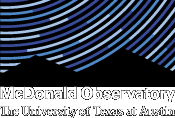Stellar Symposium Honors David Lambert's Birthday
16 June 2004
AUSTIN — About 100 astronomers will gather at Austin’s Hyatt Regency Hotel on Town Lake tomorrow through Saturday for a scientific symposium on the elements on the surface of stars. Called "Cosmic Abundances as Records of Stellar Evolution and Nucleosynthesis," The University of Texas Astronomy Program is hosting the program in honor of Dr. David Lambert’s 65th birthday.
David Lambert is currently the director of the University’s McDonald Observatory, as well as the holder of the Isabel McCutcheon Harte Centennial Chair in Astronomy.
Featuring a dozen sessions and two dozen speakers, the symposium will focus on many different aspects of the chemistry and evolution of stars. The topic is Lambert’s lifework.
Dr. Frank Bash is one of the symposium organizers, and Lambert’s predecessor as director of McDonald Observatory. "This symposium honors and acknowledges David’s contributions to astronomy — which has been to bring a whole new precision and sensitivity to the analysis of chemical elements in stars," Bash said.
He explained that all of the chemical elements except hydrogen and helium are made in stars, so analysis of the amounts of elements, or "chemical abundance," in stars gives indications about their lifecycles.
Astronomer-instrumentalist Bob Tull built a series of instruments for the 2.7-meter Harlan J. Smith Telescope at McDonald Observatory which Lambert used for his studies, Bash explained. "It was a particularly fruitful collaboration of instrumentalist and astronomer," he said.
"The result of David Lambert’s presence here is that we have become the leading observatory and astronomy department in the world in this particular kind of study," Bash said. "This work is growing in importance in astronomy overall," he said. "Especially with the rise of lots of large new telescopes like the Hobby-Eberly Telescope that allow the study of stars in nearby galaxies."
— END —
Note to Editors: More information on this symposium is available online here.





